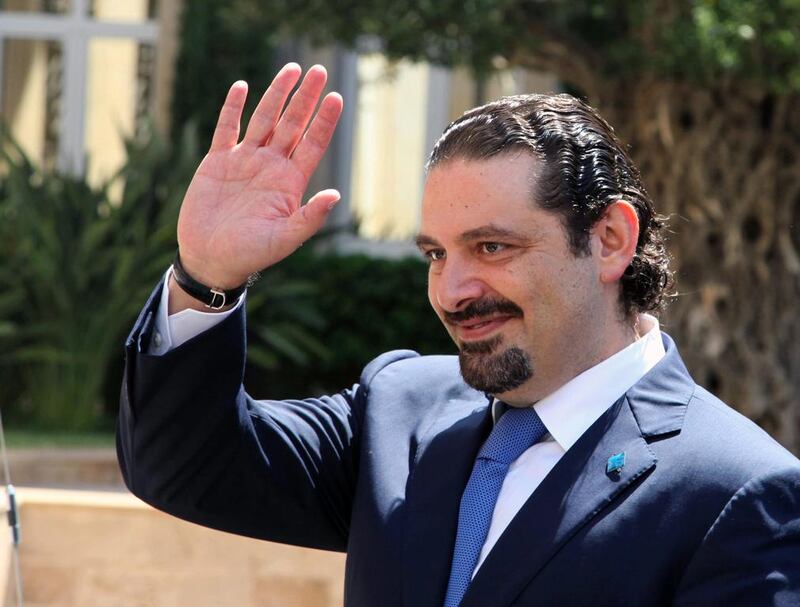As the February 14 anniversary of Rafiq Hariri’s assassination looms in Lebanon, the political coalition that emerged after the former prime minister’s killing in 2005, the March 14 coalition, today exists only in name.
The principal reason is that two of the leading figures in March 14, Saad Hariri, son of Rafik and a former prime minister himself, and Samir Geagea, the head of the Lebanese Forces party, are divided over who to back as presidential candidate.
Lebanon has been without a president since May 2014, largely because of political disagreements over who would succeed Michel Sleiman. The impasse is complete today.
In Lebanon, parliament elects the president, and on Monday parliamentarians met for the 85th time to vote, but there was no quorum. The reason is that former prime minister Michel Aoun, along with Hizbollah and its allies, have boycotted all sessions so as to build up pressure for Mr Aoun to be elected.
However, there is hypocrisy in Hizbollah’s position. In January, to break the stalemate, Mr Geagea endorsed Mr Aoun, his long-time political rival. The calculation was that this would put Hizbollah on the spot, oblige the party to rally its allies behind Mr Aoun, and break the deadlock that has undermined the institution of the presidency, which, by custom, goes to a Maronite Christian. Mr Geagea, like Mr Aoun, is a Maronite.
Yet, since then, Hizbollah has done nothing to push its allies to vote for Mr Aoun, which would allow him to win the election. This has only prolonged the stalemate, Hizbollah’s real goal.
Mr Geagea’s decision was taken after Mr Hariri, also to fill the void, had backed another Maronite, Sleiman Franjieh, for the presidency. This came as a shock to Mr Geagea. Not only was Mr Geagea at the time the official candidate of March 14, but Mr Franjieh is an old political adversary and a friend of Bashar Al Assad. Not surprisingly Mr Geagea felt betrayed, which is when he decided to support Mr Aoun.
All these moves, done without consultations, were devastating to March 14. Yet the political alliance had been suffering for years. The disagreement between Mr Hariri and Mr Geagea was only the latest manifestation of a more profound problem.
March 14 coalesced around two basic principles in 2005: opposition to a return of Syrian dominance over Lebanon after the Syrian military withdrawal that year; and opposition to Hizbollah’s efforts to dominate the Lebanese political system, whether through violence or the perpetuation of gridlock.
The first major blow to March 14 came in 2009, when a leading figure in the coalition, Walid Jumblatt, announced he was leaving for the political centre. At the time Mr Jumblatt sensed, correctly, that Saudi Arabia, Mr Hariri’s patron, was pushing him to reconcile with Mr Al Assad. To avoid his own isolation Mr Jumblatt became an independent and opened up to Syria.
Approximately a year later Mr Jumblatt’s predictions came true. Mr Al Assad, accompanied by King Abdullah of Saudi Arabia, travelled to Beirut and was greeted by Mr Hariri, who had once accused him of being his father’s assassination. This was another setback for March 14.
The coalition would revive itself in 2011, after Mr Hariri, then prime minister, was ousted by Hizbollah and Mr Aoun when they brought down his government. The uprising in Syria further united March 14, as it rallied Mr Al Assad’s foes. Yet the period was also marked by Hariri-Geagea tensions – over a controversial election law proposal and the fact that Mr Hariri left Lebanon, hindering all political coordination.
However, with Mr Al Assad now regaining the initiative at home and Hizbollah seeking to profit from Iran’s regional revival to reshape the Lebanese political order to its advantage, the need for a cohesive coalition to counter both is more urgent than ever. March 14 has been without a strategy, but that doesn’t make it any less necessary on the Lebanese scene.
However, the latest developments suggest this may be a bridge too far. Caught up in their petty disputes, often reflecting the interests of regional powers with no desire to facilitate a breakthrough, the members of Lebanon’s political class have never seemed so futile. March 14’s travails merely reflect this general state of degradation.
And yet Hizbollah is prolonging the political void for a reason. The party already dominates the political system and mainly wishes to create a political environment legitimising its weapons arsenal. It would also probably like to increase Shia representation in the state, though there is some question as to whether Hizbollah can do so without a consensus.
Lebanese sectarian politics are often a case of disparate groups aligning by convenience to prevent one political force or group of forces gaining control. March 14 began as such an alliance of convenience and if Hizbollah presses its advantage a new alignment will take shape to prevent this.
It may call itself March 14 or something else, but the broader objectives of those in it will not have changed. It is an alliance defined by its enemies. That is the weakness and strength of March 14.
Michael Young is opinion editor of The Daily Star newspaper in Beirut
On Twitter: @BeirutCalling





